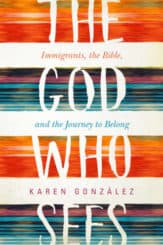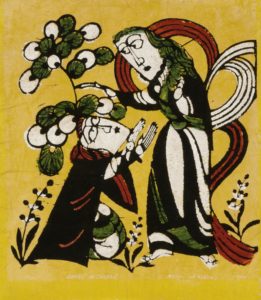
In 2006, as the U.S. Senate debated a comprehensive immigration reform bill and immigrants went to the streets in massive marches, it was difficult to find a book with a distinctly evangelical perspective on the topic of immigration.
I know, because I was looking. I’d just begun a job with World Relief’s immigrant legal services program in Wheaton, Illinois, inviting and equipping local churches to host naturalization workshops. I often met with resistance, because in the midst of what felt like a bitterly polarizing national conversation about immigration, many pastors wanted to avoid a “political” issue. I was convinced immigration was also a biblical issue, but the closest I could find to any book making this case was a dated tome by a liberal Mainline Protestant, or resources drawing heavily on Catholic Social Teaching—nothing particularly authoritative for our mostly-white, suburban evangelical church partners.
Thirteen years later, in an environment that makes the immigration rhetoric of 2006 feel idyllic by comparison, we at least have an abundance of distinctly Christian resources on the topic. There are over a dozen recent books I can recommend to help thoughtful evangelicals think biblically about how to respond to the arrival of immigrants to their communities. While some of the best of the lot are written by the immediate family members of immigrants to the U.S., almost all of these titles are authored by native-born U.S. citizens.
That’s one reason that The God Who Sees: Immigrants, The Bible, and the Journey to Belong (Herald Press, 2019) by my World Relief colleague Karen González stands out. The Bible certainly has many specific injunctions from God to his people about how to treat immigrants, but it also is a story of immigrants, whose protagonists were, more often than not, crossing borders for various reasons. Those of us who have never lived the immigrant experience tend to miss the consistent thread of immigration throughout the biblical narrative. We need our immigrant sisters and brothers to help us see the Scriptures afresh through immigrant’s eyes, a service González offers gracefully as she weaves the stories of biblical immigrants with vulnerable glimpses into her own journey.
Those of us who have never lived the immigrant experience tend to miss the consistent thread of immigration throughout the biblical narrative. We need our immigrant sisters and brothers to help us see the Scriptures afresh through immigrants eyes.
Take the patriarch Abram (later Abraham). Like so many in our world today, he was pushed from one country to another by hunger. But reaching sustenance meant an ethical dilemma: if he discloses that his beautiful companion Sarai is his wife, he might be killed so the Egyptians could take her. Instead, he makes what González describes as a cowardly, even criminal choice: he says Sarai is his sister and effectively becomes her trafficker. She is taken to be sexually exploited by Pharaoh; Abram becomes wealthy in exchange.
Few of us dismiss Abraham as merely a human trafficker or a “criminal alien,” however. As González notes, we appropriately “listen to the specifics of his story and the mitigating circumstances that brought him to such terrible actions.” Many immigrants in the United States today have also made unlawful decisions in order to feed their families, and though their legal infractions are usually limited to relatively minor offenses without a clear victim, many feel anguished by their unlawful status; they are desperate for the chance to make restitution and be reconciled to the law. While we extol Abraham as a model of faith, many U.S. evangelicals seem to have a hard time recognizing that these immigrants have an identity that is not defined by a single unlawful action. Many cannot imagine a policy solution to their situation other than deportation.
Abraham was not the only hero of Scripture to cross the border into Egypt, of course: Jesus himself, carried by Mary and Joseph, fled jealous Herod’s genocide. Even before that, Mary and Joseph were internally displaced and had to seek out a decent place in Bethlehem in which to give birth. Those narratives, from Matthew and Luke, respectively, should be on the forefront of our minds as we see asylum-seeking families at our borders, begging for safety. Immigrant brothers and sisters who have lived the uncertainty themselves—like González, who fled the violence of Guatemala in the 1980s with her family; like the immigrants throughout the U.S. who rehearse the rejection that Mary and Joseph must have felt in the Latin American Christmas tradition of las posadas—can help the rest of us to see the Holy Family in the harried families presently amassing on the Mexican side of the U.S. border, unwelcome in our country.
Indeed, we are called to see immigrants because and as God sees them. González notes that it was Hagar, a discarded slave so marginalized that her name actually means “foreign thing,” who is the first in the biblical narrative to name God. After God seeks her out in her despair, she names him El Roi, “the God who sees.” She obediently names the child in her womb Ishmael, “God hears.”
Many immigrants toil in obscurity and anonymity. How many of us know the names of the immigrant laborers who pick our fruit, clean our hotel rooms or wash our dishes? Few even bother to learn the names of those with whom they actually interact behind the counter at a fast food restaurant or transporting them from an airport. But God sees each of them, and he hears their cries.
Fundamentally, The God Who Sees is a book not just about how to treat immigrants, but about how to be immigrants. I expect that Christian immigrants will find the book particularly empowering, as González helps them recognize the parallels between their own stories and the heroes of the Bible.
But those of us who are native-born citizens probably need help understanding (from the Bible and from personal narratives like González’s) what it means to be an immigrant even more than those born abroad. That’s because the writers of the New Testament repeatedly use immigration as a metaphor for the Christian life. We’re all “aliens and strangers” on earth, according to Peter. Paul tells the Philippians that their primary “citizenship is in heaven.” The author of Hebrews describes heroes of the faith as individuals who were “strangers and exiles on earth… seeking a homeland…a better country.”
…the writers of the New Testament repeatedly use immigration as a metaphor for the Christian life. We’re all “aliens and strangers” on earth.
I understand the concept of migration on an intellectual level. But I’ve not felt the liminality that González and so many other immigrants have: being between their place of birth and the place they now live, but not fully at home in either.
It’s not uncommon for Americans to believe that we live in the greatest country on earth—but Scripture suggests that we’ve erred if we’re looking for, or focused on defending, greatness on earth. While we are called to be subject to the governments that God has established and, like the Israelites, to seek the peace of the city in which we are exiled, we should never mistake this country for our true home.
Our primary focus, as Christians, ought not to be on proclaiming our nation’s greatness or on “making America great again,” but rather on seeking that greater, heavenly kingdom where our true citizenship lies. Immigrant believers like González can help show the way.
 Matthew Soerens is the national coordinator for the Evangelical Immigration Table, the U.S. Director of Church Mobilization for World Relief and the co-author of Welcoming the Stranger: Justice, Compassion and Truth in the Immigration Debate (InterVarsity Press, 2018).
Matthew Soerens is the national coordinator for the Evangelical Immigration Table, the U.S. Director of Church Mobilization for World Relief and the co-author of Welcoming the Stranger: Justice, Compassion and Truth in the Immigration Debate (InterVarsity Press, 2018).


